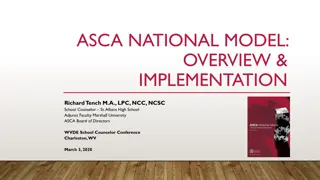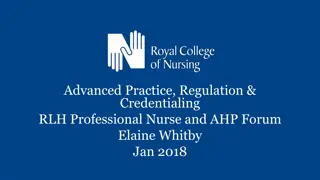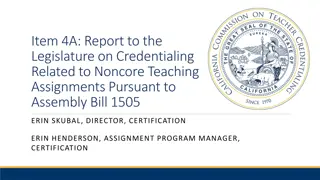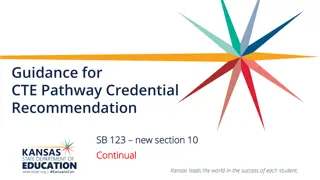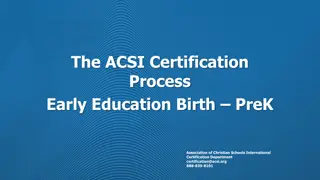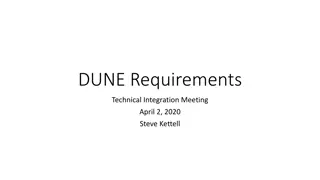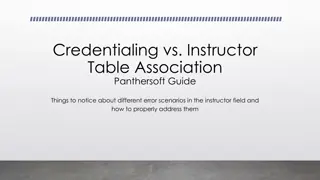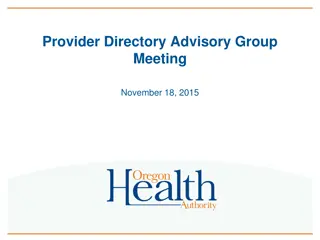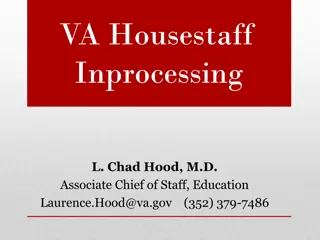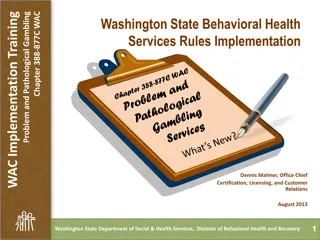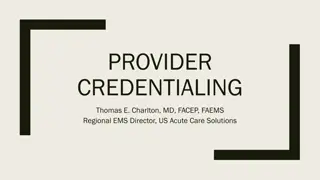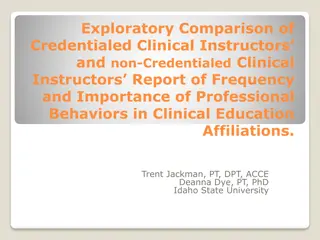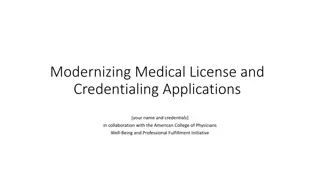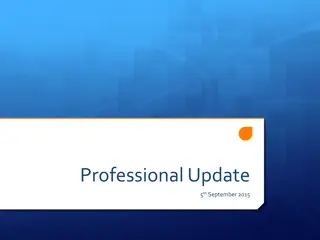Professional Credentialing: Importance and Common Requirements
Professional credentialing plays a crucial role in ensuring the qualifications and expertise of individuals in various fields. This article explores the concept of credentialing, its significance, common forms, basic requirements, and the importance of credentialing in protecting the public and upholding professional standards.
Download Presentation

Please find below an Image/Link to download the presentation.
The content on the website is provided AS IS for your information and personal use only. It may not be sold, licensed, or shared on other websites without obtaining consent from the author. Download presentation by click this link. If you encounter any issues during the download, it is possible that the publisher has removed the file from their server.
E N D
Presentation Transcript
Who is Certifying Whom? ABAI 2022 Drs. Gordon Bourland & Noor Syed Presented in the symposium: Some Recent Developments Related to Behavior Analyst Licensure: Some Recent Adventures of the ABAI Licensing Committee, ABAI Annual Convention, Boston, Massachusetts, USA, May 30, 2022
Sources of information Websites for behavior analysis certifying organizations (as of 05/29/2022): BACB: https://www.bacb.com/ IBAO: https://theibao.com/ QABA: https://qababoard.com/ BICC: https://behavioralcertification.org/
Caveats/disclaimers: The opinions are those of the presenters and not necessarily those of any organization with which they are associated. The presentations are provided for educational purposes and are not legal counsel. 1. 2.
What is credentialing and Why is it important?
What is credentialing? In general, credentialing: A formalized way to communicate about the qualifications AND presumed expertise of someone- a certificant
What is credentialing? Multiple forms of professional credentialing- Frequently encountered forms of credentialing; Registration Certification Licensure/ registration in sense used in UK, Canada, India, etc NOTE: great variability within each type of credentialing
What is credentialing? Common basic requirements of professional credentialing? Training/ education germane to the profession Experience in activities of the profession Examination Background check Commitment to code of conduct
Why is credentialing important? Common rationales for/ functions of professional credentialing: Protection of the public Hygiene or monitoring of the profession Protect the profession NOTE: Different types of professional credentialing address each of these possible functions to varying degrees
Short Credentialing History or Behavior Analysis Part 1 1970s: Extremely problematic behavior modification programs (i.e., Sunland Miami); discussion of certification began in earnest & early attempts were made (e.g., Minnesota Certification program through MABA, Peer Review Committee in Florida) 1980s: MABA certification disbanded; work of PRC continued to form certification 1983: First professionally developed examination given in Florida 1994-1996: First Edition Task List published; bachelors and masters level examination given (CABA & CBA) in Florida; other states began using Florida exam
Short Credentialing History or Behavior Analysis- Part 2 1998: Second Edition Task List; Dr. Jerry Shook incorporated BACB 2005: All (6) states began using BACB rather than Florida exam 2007: BACB accredited by National Commission for Certifying Agencies (NCCA) 2009: Licensure began due to insurance mandates, etc 2010: First BACB Code of Ethics published 2019: BACB announces it will no longer be providing global certification effective 2023
Today BCBAs 55,628 BCaBAs 5,571 RBT 115,238 No. of Countries with Certificants 119, including U.S. & Canada No of States with Licensure 36 or 72%
Impetus for This Investigation As of 2023, the BACB will no longer be credentialing behavior analysts from many parts of the world. Colleagues from different countries are now considering how to obtain certification in their respective countries. Multiple organizations now provide certification of behavior analysts. For behavior analysts living where the BACB will cease providing certification, which certification(s) should behavior analysts pursue?
Some considerations/ implications for credentialing of behavior analysts?
Some considerations/ implications for credentialing of behavior analysts Licensing boards Which of the multiple behavior analyst certifications to accept as foundation of licensure? How to decide?
Some considerations/ implications for credentialing of behavior analysts Global colleagues Need for and interest in credentialing of behavior analysts? Infrastructure for credentialing of behavior analysts?
BACB IBAO QABA BICC U.S., Canada, U.K., Australia Global Global Global Geographic availability 1998 2020 2012 2013 Year established Littleton, CO, USA Marietta, Georgia, USA Ogden, UT, USA Jerseyville, IL, USA Organization office location Non-profit For profit For profit Non-profit Type Organizational credential from National Commission for Certifying Agencies Member, Institute for Credentialing Excellence ANSAI National Commission for Certifying Agencies Behavior analysis Behavior analysis Behavior analysis & autism Behavior analysis & autism Scope Board Certified Behavior Analyst (BCBA) & BCBA-D International Behavior Analyst Qualified Behavior Analyst Board Certified Autism Professional Credential for independent practice
Exam info BACB IBAO QABA BICC Online at testing center Remote online with proctor Remote online with a proctor Online at testing center OR remote online with proctor Testing 71: Foundations 104: Applied Philosophical Underpinnings; Concepts and Principles; Measurement, Data Display, and Interpretation; Experimental Design; Ethics; Behavior Assessment; Behavior- Change Procedures; Selecting and Implementing Interventions; Personnel Supervision and Management Autism Spectrum Disorders; Legal, Ethical, Professional considerations; Core Principals (sic) of ABA; Antecedent Interventions; Skill Acquisition; Behavior Reduction Intervention; Data Collection Analysis; Assessment; Training and Supervision Autism, Principles of ABA, Skill Acquisition; Reduction of Problem Behavior; Data Collection; Ethical/Legal Considerations: Clinical Management 7 broad categories Core Concepts; Recording and Measuring Behavior; Single-case Designs; Behavioral Assessment; Behavioral Interventions; Teaching Methods and Variations; Ethics Topics 175/175 150/150 125/119 (05% re autism) 175/160-163 (07- 09% re autism) # items Total/ Behavior analysis
Exam info BACB IBAO QABA BICC 1. Graduate degree (master s or doctoral) from an accredited institution 2. Training: Complete a minimum of 285 hours of coursework across content areas Education requirement Pathway 1: Master s degree or higher from an ABAI-accredited or ABAI-recognized behavior analysis degree program (ABAI Tier 1, 2a, 2b); Pathway 2: Graduate Degree, Behavior-analytic Coursework- 315 hours. Also, Pathway 3- graduate teaching & Pathway 4- Postdoctoral experience Bachelor s Degree (*or regional equivalent of 2 years post- secondary Education) Then: 1. Masters/ Graduate Route: Complete Masters degree OR 2.Experience Route: A.Complete Required Educational Objectives (REO) AND B.Candidate Projects- 2 types of projects aligned with REO, demonstrate learning or application of REOs, and advance the candidate's knowledge. Master s degree from an accredited institution in a related field Must have completed 270 hours of approved coursework (18 semester credits), including 8 hours of supervision coursework (master s degree in ABA, Psychology, Special education, or a related field). 5 hrs. of coursework must be in ethics and 20 hours in autism core knowledge.
BACB IBAO QABA BICC Supervised experience Total Hours ABA hrs/ other hrs 2000 or 1500 in behavior analysis 1000 including Candidate Skills Testing twice (also 12 hours CEU) 1500 behavior analysis minimum 900 hours oversight or supervision of service provision 1000 in evidence based autism services % supervised hrs 05% or 10% 05% 05% Not stated Documented expertise in behavior analysis- 1.BACB certification: 2.Licensed or registered psychologist certified by the American Board of Professional Psychology in Behavioral and Cognitive Psychology with testing in ABA; 3.VCS Instructor 5 options: 1.IBA in good standing: 2.A credentialed behavior analyst- certified or licensed; 3. Masters or doctoral degree from ABAI- accredited program; 4. Masters or doctoral degree in a related discipline,completion of IBA Required Educational Objectives, or equivalent; 5. Masters or doctoral degree, at least 5 years direct employment in the ABA field with supervisory experience (*with portfolio review and approval from IBAO) 1.Licensed practitioner within the scope of ABA; 2.State licensed practitioner within the scope of ABA (e.g., Licensed Behavior Analyst, a licensed psychologist who is certified by the American Board of Professional Psychology who was tested in ABA) QMHP Supervisor requirements
BACB IBAO QABA BICC Supervised experience Allow group supervision Max/group=10 Max/group= 5 Up to 50% Max/group- not stated Not stated Limit on direct service w/clients Required, max= 40% Not addressed Max=25% Documentation period 1 month 3 months 1 month max (could be weekly) Not stated
Ethics BACB IBAO QABA BICC 4 core principles plus 6 topics; 85 items 8 topics; 51 items plus 6 steps of Resolving Ethical Issues Using a Problem Solving Model 10 topics; 60 items 3 topics; 15 items Scope Yes; enforcement actions taken & posted online Unable to find posting of ethical actions taken- emphasis on contextual & contextual analysis Yes; unable to find posting of enforcement actions taken Yes; enforcement actions taken, available online (found 1 possible posting) Ethical standards enforced?
Ramifications Colleagues globally must assess how to move forward in protecting ABA consumers Advanced knowledge needed Lobbying government Passing of laws & policies Accreditation Boards to oversee licensure and/or certification Etc. ABAI must consider taking lead on supporting for licensure & certification
Whats ABAIs role? What it s not: -Control everything -Issue credentials -Tell behavior analyst and behavior analytic organizations what to do
Whats ABAIs role? What it is: -Advise behavior analysts, upon request (c.f., ABAI Licensing Committee) -Provide technical assistance -Promote high quality, ethical practice of behavior analysis -Be a catalyst for the development of various components of effective, efficient, valid credentialing of behavior analysts
Our Recommended Actionable Items for ABAI 1. Create a systematic data collection procedure to analyze challenges, current policies, steps being taken, etc. for global protection of consumers -Provide support for collecting this information locally 2. Disseminate public-facing report on findings to support colleagues who have not formed affiliate chapters 3. Support & training sessions for colleagues globally who are seeking to form oversight organizations 4. FUTURE: Based on meta-analysis of reports, create global standards for oversight organizations
Whats the primary role of behavior analyst credentialing? Protect the public!!







